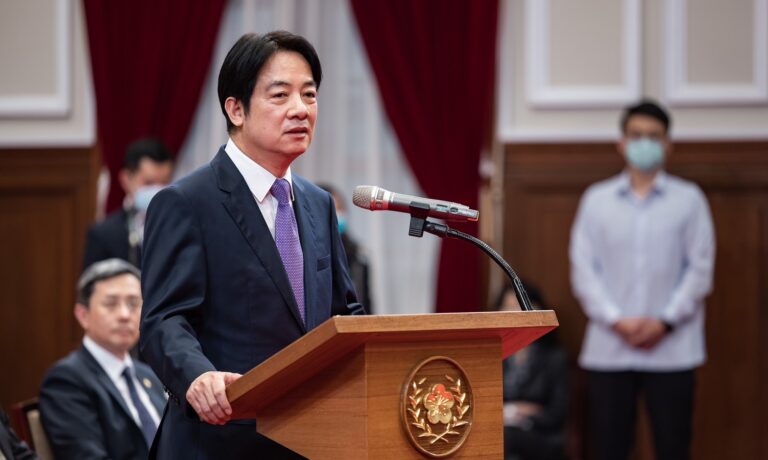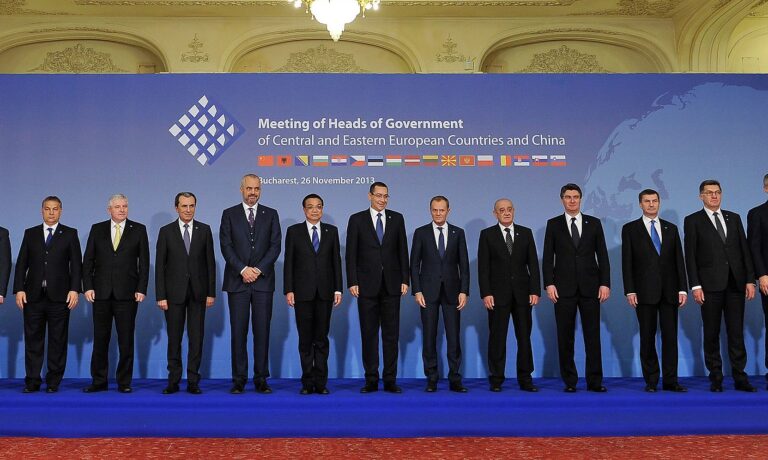#cooperation
Decoding De-Risking: EU’s China Strategy and Its Implications for Croatia
As the EU recalibrates its China strategy with a focus on de-risking, Croatia finds itself navigating the intricate balance between cooperation and caution. This article is part of a series of articles authored by…
In the Same Boat: Why Taiwan is Strengthening Ties with Central and Eastern Europe
Increasingly under pressure from China, Taiwan is seeking new like-minded partners in Central and Eastern Europe.
Beijing Seeks a Gateway to Europe via Budapest
Beijing’s main interest in strengthening relations with Budapest is not about Hungary itself but about Europe as a whole. A friendly EU member means opportunities to shape EU-China economic and political relations more in the CCP’s favor. The long list of strategic sectors in which the two sides signed cooperation agreements during Xi’s Budapest visit should be a concern for other EU and NATO states.
Closed Discussion: Sino-Russian Ties in the Context of the War in Ukraine
In March, the CHOICE project, with the support of the Prague office of Konrad-Adenauer-Stiftung, hosted a closed discussion in Prague with CHOICE Visiting Fellow and Post-Doc Researcher at the Austrian Institute for International Affairs…
Roadblocks Ahead? Taiwan-Europe Relations After 2024 Elections
The victory of Democratic Progressive Party’s William Lai in the 2024 Taiwan presidential elections signals that Taipei is likely to continue its strategy of diversification of foreign relations, which includes building up stronger ties with Europe. At the same time, domestic politics, and tensions between the executive and the legislative branch in particular, can challenge the development of Taiwan-EU ties. Efforts to build up “Taiwan literacy” within the bloc and a clearer Europe strategy in Taipei will be key to safeguarding the progress achieved to date.
Commitment to Democracy Triumphs in Taiwan’s Elections
The victory of Lai Ching-te in the Taiwanese presidential elections presents new avenues for Taiwan-EU cooperation.
Voice for CHOICE #33: Discussing Prague Castle’s China Policy with Petr Kolář
After the honeymoon period of Czech-China relations that started in 2013, the bilateral ties gradually soured. This shift was linked to the perceived lack of benefits stemming from economic cooperation and various security-related events…
Climate Diplomacy in Turbulent Times: EU and China Re-Engage
The EU needs to shape the current phase of re-engagement with China by adjusting its approach to environment and climate cooperation on two fundamental levels. Moving away from dialogue for the sake of dialogue, the EU Commission has to consider the different political perceptions of climate cooperation and pursue a more stakeholder-centric approach with China.
EU-China relations have seen a rough few years with China’s inward-turn during the time of COVID-19, and economic competition and political tensions increasing. Ties in most areas of the relationship have been interrupted, with communication in several issue areas coming to a halt. In this situation, EU policymakers have started to see environment and climate as the partnership topic in their relations with China. As a major issue of common interest, it is often viewed as a useful means to keeping dialogue channels open.
Therefore, in the past few COVID-affected years, meetings on environmental and climate matters have mostly served as a platform for engagement, without necessarily expecting concrete results. Even when environment and climate were not to be the main focus of EU-China meetings, these issues were elevated on the agenda to balance the contentious trade and political issues. The same logic appears set to guide the upcoming EU-China summit in early December.
One persistent concern in the EU regarding climate engagement with China is striking the right balance between cooperation and competition. While the EU appears inclined towards a cooperative stance, it is concurrently engaged in heated competition with China, as exemplified by its recent anti-subsidy investigation into Chinese electric vehicle imports, just as China has restricted key electric vehicle battery component exports. This state of competition and simultaneous cooperation will remain a key feature of the EU-China climate relationship.
EU-China Climate Dialogue and its Results
Within the various EU-China forums and platforms through which climate engagement takes place – both informal and formal – cooperation appears to work better through some channels than others. Currently, the most important dialogue on environment and climate is the High-Level Environment and Climate Dialogue (HECD), as it features the highest-ranking representatives from the two sides.
The fourth HECD took place in July and does not appear to have brought many deliverables apart from defining “avenues for cooperation.” A question remains as to what has become of the outcomes of the three dialogues in previous years. An EU official involved in the talks pointed out that between the third HECD in 2022 and the fourth one this year, the EU and China had agreed to convene technical cooperation formats in which bilateral expert groups would address issues such as methane emissions reductions. There have been delays in follow-up discussions. On the EU’s side, it is assumed that these are linked to the late adoption of China’s Methane Emissions Action Plan.
Whatever may have led to other commitments made during previous dialogues not being implemented, a note at the top of the Joint Press Release of this year’s HECD gave reason to hope for more concrete results in the negotiations to come: “Both sides fully recognized that the HECD must continue to achieve practical results.”
We have already seen some follow-up dialogues, which is a welcome sign. However, it was noticeable that the press release appeared more than three weeks after the meeting was convened. This begs the question as to why it took so long to reach an agreement that only had little substance.
What Needs to Be Done
To make the cooperation with China on climate and environment in the current phase of re-engagement more meaningful, the EU needs to adjust its approach on two fundamental levels.
First, the EU has to consider the divergent political perceptions of climate cooperation. Climate and environment have a different place on China and the EU’s list of priorities and in relation to other aspects of their relationship. On the EU side, climate is high up on the agenda, and Brussels is trying to treat climate independently of other topics in the relationship such as trade or politics.
Meanwhile, China views climate issues as just one facet of its foreign engagement, often downplaying their significance in favor of other priorities. Chinese representatives’ recent messaging at conferences like the G20, the United Nations General Assembly, and BRICS signaled that. Notably, the Chinese leadership prioritizes development overall above climate. Xia Yingxian, the head of China’s Ministry of Ecology and Environment’s (MEE) climate office and the incoming successor to climate envoy Xie Zhenhua, stressed the importance of respecting “different starting points and national conditions of each country.” Xia made this point on prioritizing development even more clear by stating that “COP28 should promote effective coordination between addressing climate change and poverty eradication, energy security, job creation, economic development and other needs.”
Furthermore, China’s integrated approach toward climate cooperation is evident in that it does not isolate climate from tense political relations and other areas. The Chinese Ambassador to the EU, Fu Cong, made this point clear: “Global climate governance does not happen in a vacuum. One should not seek political confrontation on the one hand and expect unconditional cooperation on the other. ” This approach stands quite in contrast to China’s relatively far-sighted thinking in other areas. Tying political tensions to joint climate action neglects the fact that global climate change does not halt on account of bilateral political frictions. Both sides are likely going to face even more severe consequences if they do not find a joint path forward. EU stakeholders need to keep this different perception in mind when negotiating with China on climate issues.
Additionally, Xi Jinping confirmed in July what has already been evident when observing Chinese behavior in the climate sphere over the last few years: China intends to advance toward carbon neutrality in a self-determined way, and the path will “never be influenced by others.” Some in the EU seem to have internalized the reality that China is moving at its own pace when it comes to its climate action while others still think that the EU or other partners can push Beijing to increase its ambition.
Second, Chinese government and party politics seemingly continue to be a black box, therefore the EU should put more emphasis on stakeholder-centric engagement with China.. Frequent institutional reshuffles – the last one took place in March 2023 – may be one reason for the continued lack of understanding of Chinese decision-making processes. The higher the political rank of the government official, the more leeway for decisions foreign partners such as the EU can expect in dialogues.
As a solution, the EU could adapt its approach to climate cooperation, moving beyond the more or less successful cooperation with China in technical areas (e.g. methane, target setting, etc.) and towards an additional focus on stakeholder-centric engagement. Ahead of climate dialogues, it is crucial for the EU to involve the right institutions and government representatives, a practice that currently seems inconsistent, in order to better grasp China’s decision-making processes and responsibilities. This adjustment, while not radical, is crucial. Technical cooperation, where the EU excels, no doubt remains important. However, investing that extra time in coordination and not agreeing to dialogues just for the sake of dialogue, may expedite climate negotiations and lead to more concrete outcomes.
China and the EU as Joint Climate Forerunners?
While the US and China’s involvement is crucial for significant climate progress – not only at the upcoming COP28, but beyond – with its normative power, the EU also plays a vital and consistent role in global climate action. It remains unclear whether the US will stay on the same course on climate issues after the US election next year. Research has found that the US retreat from the Paris Agreements during the Trump administration paved the way for increased EU-China interdependence on climate issues. A similar scenario might be replayed.
To ensure positive competition in areas like green technology and resource supply chains, the EU and China must collaborate effectively during the current re-engagement phase. This period offers an opportunity to revamp climate cooperation and set a high benchmark for global climate leadership. However, in order to be successful, the EU has to significantly adapt its approach and make sure it delivers results.
Working Breakfast: Chinese Influence in the Western Balkans
In October, the CHOICE project, with the support of the Friedrich Naumann Foundation for Freedom, hosted a closed working breakfast in Prague with CHOICE Visiting Fellow and Program Coordinator of the Foundation BFPE for…
Has Russia’s War Against Ukraine Damaged Poland’s Relations with China? Not as Much as You Think
Despite more hawkish rhetoric from Warsaw, practical cooperation between Poland and China has remained surprisingly unaffected by the outbreak of the war.
The Role of Cities in German China Policy
The engagement of German cities with their Chinese partners has come under scrutiny recently. As cities like Kiel explored cooperation with China, questions arise about the balance between local economic interests and national security concerns.
A Big Amount of Nothing: Looking into Czech Participation in the 14+1
The Czech Republic is in the process of revising its policy towards China under the reign of a center-right government. As the country is still a part of the 14+1 format, the issue of continued participation in the platform is naturally part of the review. In spite of that, no (public) assessment of Czech participation in the platform since its inception in 2012 has been conducted. Did the Czech Republic gain anything at all from its engagement with China under this format?











